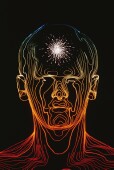
WEDNESDAY, March 6 (HealthDay News) — For people suffering from severe, tough-to-treat anorexia, having a biological “pacemaker” implanted in their brain may help ease the disorder, a small new study suggests.
The researchers noted that anorexia is the psychiatric disorder with the highest mortality rate and, although therapies exist, not everyone benefits in the long term. The disorder is among the most common psychiatric ills diagnosed among teenage women. Up to 20 percent of patients do not respond to available treatments, which usually focus on behavioral change.
The new study examined the effectiveness of an approach called deep brain stimulation (DBS), sometimes called a brain pacemaker. The procedure requires surgery, but is minimally invasive and reversible, the researchers said.
“Brain stimulation is a growing and acceptable science and has been approved and used in Parkinson’s and treatment-resistant depression,” said Dr. Alan Manevitz, a clinical psychiatrist at Lenox Hill Hospital in New York City, who was not connected to the study.
The authors of the new study, published March 6 in the journal The Lancet, said the treatment could be effective for people with anorexia who fail to respond to other forms of treatment.
In this pilot study, involving six female patients, at least half of the women with anorexia — who did not respond to other forms of treatment — showed improvements in both their mood and their body-mass index (a measurement of body fat based on height and weight). The women were between 24 and 57 years old and had suffered from anorexia for between four and 37 years.
Using MRI, researchers based at the Krembil Neuroscience Centre and University Health Network in Canada, identified a thick bundle of nerve fibers that divides the left and right sides of the brain. Electrodes were then implanted into the area and connected to a pulse generator placed under the women’s skin. Ten days after the device was implanted, the researchers activated it and recorded any changes in the patients’ mood and anxiety levels, compulsive behavior and eating patterns.
The study found that the procedure was safe. Only one patient experienced a serious adverse reaction, which was related to a metabolic disorder resulting from her anorexia.
The device seemed to outperform traditional therapy, the researchers said. Before the device was implanted, five of the six patients had recently undergone inpatient treatment, which resulted in some healthy weight gain. After two months, however, all six patients had lost the weight again.
Three months after the DBS procedure, however, this pattern began to reverse. The researchers found that five of the six women were either maintaining or gaining weight. Nine months later, three of the patients had a higher weight than before treatment began. Half of the patients also experienced better moods and less compulsive behavior.
“The finding of improvements in mood and anxiety in patients who were still underweight is especially striking, in view of the well-known poor response of underweight patients to conventional [drugs] or psychotherapies,” study co-researcher Dr. Andres Lozano, a leading neurosurgeon in the field of DBS, said in a journal news release.
In a journal commentary on the study, Dr. Janet Treasure and Dr. Ulrike Schmidt, of the Institute of Psychiatry at King’s College London, in England, said, “New effective treatments for these patients are sorely needed — the findings of this … study are promising and will give hope to patients with especially pernicious forms of the disorder and their families.”
“The fact that the procedure was associated in some patients with improvements in affective and obsessional symptoms is of key importance,” they added, “since such improvements will go some way toward reassuring patients that DBS is not just another treatment designed to fatten them up without making them feel better.”
The study’s authors, however, said larger trials are needed to confirm these early findings.
For his part, Manevitz called the new findings “very exciting but preliminary,” and agreed that a larger trial is needed. He also said the approach may not be right for every patient struggling with anorexia.
“Since deep brain stimulation involves a surgical procedure implanting a mechanical device in the brain, it is a very serious procedure and should only be considered in consultation with a knowledgeable physician in this field,” he said.
Another outside expert agreed.
“DBS is an invasive procedure that should be reserved for patients who have exhausted all treatments and are not improving,” said Dr. Rosemarie Francisque-St. Victor, director of adolescent medicine at Brookdale University Hospital and Medical Center in New York City.
She said the technique “can have adverse reactions such as coma, meningitis, brain hemorrhage, seizure and stroke, to name just a few. Having said this, there is a strong obsessive-compulsive disorder component to this illness. Therefore, DBS may be part of the treatment options offered to patients when all else has failed.”
More information
The U.S. National Alliance on Mental Illness provides more information on anorexia.

